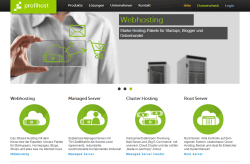Web hosting companies on special offer: Why we see so many M & A in the hosting industry
We are delighted to have the opportunity to speak with Sebastian Bluhm, CEO of Profihost AG from Hannover, about the topic of Mergers & Acquisitions in the hosting industry.
ht: Good day Mr. Bluhm, could you briefly introduce your company.
sb: Certainly. Profihost AG is a privately owned, medium-sized hosting company. We have been in existence since 1998, starting as a provider of what was then "simple web hosting" from a bedroom. Today, we are one of the leading medium-sized and independent hosting providers in Germany. In 2012/2013, we were one of the first German providers to launch our own cloud platform, making us pioneers in German cloud hosting. We have early specialised in providing cloud infrastructures (IaaS). As one of the few providers, we operate a genuine (!), fail-safe, scalable, and above all German cloud.
ht: The recent years have been marked by further acquisitions in the web hosting market. Is it becoming increasingly difficult for web hosting providers to grow without good access to the financial market?
 sb: This question needs to be viewed in a nuanced manner. Firstly, it should be noted that organic growth will not become more difficult due to market acquisitions, but rather because the demand in the market is decreasing as market saturation has occurred. The cake has largely been divided. It is more about whether and how a redistribution takes place.
sb: This question needs to be viewed in a nuanced manner. Firstly, it should be noted that organic growth will not become more difficult due to market acquisitions, but rather because the demand in the market is decreasing as market saturation has occurred. The cake has largely been divided. It is more about whether and how a redistribution takes place.
From this perspective, we observe the consolidation process with great interest and believe that, in the end, it will be advantageous for market participants who have clearly positioned themselves in the market. We are exclusively interested in sustainable customer relationships and, in addition to technically sophisticated products, we place special emphasis on agile, personal, and high-quality consultation. You can imagine that many customers, especially after being taken over by a provider under pressure to carry out numerous transactions, place great value on this.
Therefore, we also welcome the disappearance of very small market participants who do not offer such quality. Consider that access to the web hosting market was possible many years ago due to the lack of professionalism. The technical requirements were low, and because of the original online trade, the entire business could practically be offered from one's own home. The market segment is also not restricted by any access regulations.
ht: Since the founding of Profihost AG, you have acquired several web hosting providers and their customers - how did this come about?
sb: Acquiring business shares is not a fixed part of Profihost AG's growth plan. Our top priority is to maintain the professionalism and quality of our company and products. Primarily, we aim to grow with our existing customers and organically acquire new customers. This sets us apart clearly from the competition. A growth strategy driven by capital would contradict our positioning, as it would jeopardise our independence and trust.
However, this does not mean that we are not interested in acquiring existing hosting providers. In recent years, we have successfully completed several small and medium transactions. However, we carefully assess how we can integrate the customers, employees, and products into our processes to ultimately create added value for the customer. This does not work with a "cold" takeover of customers but usually due to an existing partnership with the entrepreneur. The often loose partnership shows whether we are a good fit. The entrepreneur already benefits from our technical progress at this stage. The acquisition then becomes a logical consequence. Integrating the company and employees is easily achievable without much effort.
ht: Should one speculate on selling their hosting business - is there a typical scale at which a sale makes sense?
sb: Speculation is always a risky strategy. This has various reasons: a hosting provider who has the financial means provided by investors is generally only interested in large and very large transactions. Otherwise, the transaction and migration costs are too high. Smaller providers will therefore increasingly struggle to find a buyer, and the threshold of critical mass (for an acquisition) will tend to rise.
In this area, we have had very good experiences with our partnership model to keep transaction costs within limits. However, a smaller provider should not speculate on this, as a crucial criterion is the quality of the customer base and customer satisfaction. The entrepreneur should focus on this sustainability. It is a significant factor in the decision to acquire, especially for smaller and medium transactions. Additionally, with small providers, there is always a risk that, due to a lack of long-term perspectives, the existing knowledge carriers may leave the company.
ht: How can the value of a hosting customer be quantified?
sb: The value of a hosting customer largely depends on the revenue volume (quantity) and the value (quality) of each customer. Usually, the entire customer base is considered. In the end, the evaluation is based on how much money has been or will be earned with the company/customer. In "smaller" segment transactions, usually only customer relationships are evaluated, as they are then bought in the end, not the legal entity as a whole. Then, the products, customer contracts, and customer development are closely examined. At the end of the process, depending on the valuation model, there may be an offer as a multiplier on revenue (e.g. 1.5 times annual revenue) or as a multiplier on profit. A rough estimate could be 4-5 times annual profit for small providers, while for larger providers, this could go significantly higher, even up to 8-10 times annual profit.
ht: In an acquisition, the customers of the provider are usually taken over - but what about the employees and the technical infrastructure?
sb: Here too, it is important to differentiate, and it cannot be generalised. In general, there are two main directions. We observe that providers with investors as shareholders are primarily interested in customers and less in employees or technical infrastructure.
When we carry out transactions, we pay special attention to the employees. We always have a need for qualified personnel in general and face challenges in meeting our staffing needs. It would be foolish to disregard the individual interests of the employees. It is also a crucial factor in assessing sustainability whether the owner and employees have an interest in contributing to our company in the future. Through the known personal contacts, we can ensure that customers feel even better looked after with us.
However, it depends on the individual case. We place great importance on a well-coordinated team, as every successful company requires great teamwork. In terms of technology, it is often the case that transactions start in a partnership, so the seller often already relies on Profihost AG's technology. Then we have no problems. A common reason for a partnership or sale is the realisation - in the area where we conduct transactions - that the technology used is no longer "state-of-the-art", and therefore the question of technology often does not arise, but rather how much we can migrate the company to our technology.
 ht: What can be the advantages of a sale?
ht: What can be the advantages of a sale?
sb: This is extremely diverse. I can only speak from our experiences in the small and medium market segment. We observe that the desire of an entrepreneur to sell their company is preceded by a process of self-reflection. The realisation has set in that, in the fast-paced and now highly professionalised market, one cannot survive long-term. Just think of proprietary cloud solutions. This development is often referred to as disruptive technology because a small single server is no longer sufficient. Without investments in the seven-figure euro range, you cannot operate a competitive platform. Not to mention the lack of know-how and personnel.
On the other hand, there are also many cases where the entrepreneur realises that they would prefer to focus fully on their core competencies and reduce the burden of many small issues that come with being an entrepreneur. An important part of our discussions with partners and sellers is to find out the reasons and goals of the individuals to develop an interesting and mutually beneficial solution.
ht: In your opinion, how will the coming years unfold with acquisitions and mergers? Will the large companies continue to grow, while the small ones increasingly struggle to survive in the market?
sb: I believe it is a normal consolidation process that will continue to progress. Every medium-sized entrepreneur must always and continuously ask themselves how they position themselves in the market, what sets them apart from others - especially large participants. I am not revealing any secrets when I say that entrepreneurs whose shareholders are not investors cannot define themselves in the long term based on the price or the features of standardised products. Anyone who does so will find it challenging.
If hosting providers have any questions, Sebastian Bluhm (CEO of Profihost AG, sebastian.bluhm@profihost.com) is available for a personal discussion.
Thank you!
The interview was conducted by Marco Keul
Profile
Name: Sebastian Bluhm
Position: Board Member, responsible for Partnerships and M&A
Company Type: Public Limited Company
Employees: approx. 45
Established since: 1998
Customer Base: mainly Business Customers
Offered Products: Cloud Hosting, Shop Hosting, Enterprise Hosting
www.profihost.de
Provider Profile
Write a comment
- Interview
Tags for this article
More web hosts
More interesting articles
Web hosting in 2018 - Interview with Checkdomain
We spoke with Checkdomain about the disruptions in the hosting market and dared to look ahead to the hosting year 2018.
Smart Domain Management: Interview with ResellerInterface at CloudFest 2025
At CloudFest 2025, Marco from hosttest met Larissa Reinhart, Marketing and Sales Manager of ResellerInterface.
IPv6: The Future of the Web
The well-known IPv4 system is outdated. IPv6 is ready to take over. But when will the new standard be widely implemented...
WebPros in Interview: WP Squared and WP Guardian
We had the opportunity to speak at Cloudfest 2024 with Alexandra and Alexandra from WebPros about the challenges of the ...
Impact of GDPR on Web Hosting Providers and Hosting Customers
In particular, we will address the consequences of the new directive for web hosting providers and hosting customers and...
What does the web hosting market look like in 2025?
We spoke with two hosting experts about the last 10 years of web hosting and how the market will change in the next few ...




